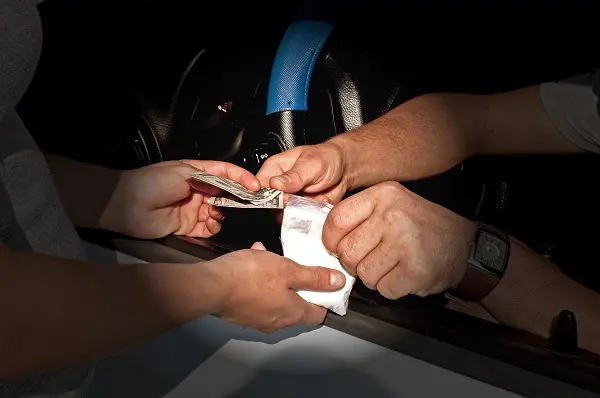
Being charged with possessing a controlled substance with the intent to distribute in Texas brings more severe penalties than being charged with simple possession for personal use. A person convicted of possessing a controlled substance with the intent to distribute could potentially face hundreds of thousands of dollars in fines as well as a life sentence.
On This Page
Texas law defines “distribute” as meaning to deliver a controlled substance other than by administering or dispensing the substance. In most cases, distributing means the sale of a controlled substance – drug dealing.
Penalties for Possession With the Intent of Distributing a Controlled Substance in Texas
Depending on the amount of drugs a person has in their possession at the time of the arrest, if found guilty of possession with intent to distribute a controlled substance in Texas, they could be facing up to $250,000 in fines and up to life in prison.
Marijuana has its own category. Depending on how much marijuana a person has in their possession at the time of their arrest, if found guilty of possession of marijuana in Texas with the intent to distribute, they could be facing up to $100,000 in fines and life in prison.
You may also face additional fines and/or prison time if you have prior convictions for similar crimes, had the drugs on you while committing another crime, distributing drugs in the presence of a minor, or if a person dies as a result of using the drugs they acquired from you.
Circumstantial Evidence Is Often a Deciding Factor
How does Texas law determine that an individual found in possession of drugs intends to distribute them instead of just possessing them for personal use?
Texas law enforcement officials take into account a wide variety of factors when determining if an individual found in possession of a controlled substance intended to distribute it or if it was intended for personal use. In many instances, the arresting officers don’t actually catch the individual in the act of distributing the drugs but often make their decision based on circumstantial evidence found at the scene of the arrest, including:
- Large quantities of drugs – not consistent with personal use
- Large amounts of cash
- Firearms and other weapons
- How the drugs are packaged; for example, in individual baggies of certain weights
- Paraphernalia – scales, packaging materials
- Voicemails or text messages found on a suspect’s phone or other device at the time of the arrest pertaining to the distribution of a controlled substance
- The location of the arrest has a history of being used as a place to distribute drugs
- The suspect tests clean for the drug at the time of the arrest, implying they are not users
Because of the role circumstantial evidence plays in a possession with the intent to distribute illegal drugs case, who you choose as your defense lawyer may mean the difference between an acquittal or conviction. In addition to the fines and jail time, being convicted of possessing drugs with the intent to distribute in Texas can have other negative effects on your life, including making it difficult to find a job, get housing or in prevail in child custody disputes.
If You’ve Been Charged With Possession of a Controlled Substance With Intent to Distribute in Houston
If you have been charged with possession with the intent to distribute in Houston or surrounding communities, you need an experienced Houston drug crimes defense attorney on your side.
As a former county prosecutor turned Houston criminal defense attorney, Lisa Shapiro Strauss is familiar with how the state uses circumstantial evidence to obtain a conviction for possession of a controlled substance with the intent to distribute. This experience allows her to develop an effective defense strategy that protects her client’s rights and ensures they receive due process under the law.
Call the law offices of Lisa Shapiro Strauss to schedule a consultation to discuss your case.




